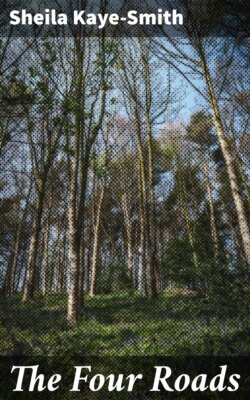Читать книгу The Four Roads - Sheila Kaye-Smith - Страница 11
На сайте Литреса книга снята с продажи.
8
ОглавлениеTable of Contents
April was May before Tom’s weeks of grace had run. The field hollows were white with drifts of hawthorn, and the pale purplish haze of the cuckoo-flower had given place to the buttercups’ dabble of gold. The papery-white of the wild cherry had gone from the woods, which were green now, thick, and full of the nutty smell of leaves. The ditches were milky with fennel, and on the high meadows by Thunders Hill the broom and the gorse clumped their yellows together, making the hill a flaming cone to those who saw it from the marshes of Horse Eye.
The farmers of Dallington watched their hayfields rust. There was little corn in that country bounded by the Four Roads, so as the sun climbed higher noon by noon, the neighbourhood grew gipsy-brown—the straw-coloured feathers of the grass veiled a glowing heart of clover, and above them opened the white ox-eyes and pools of sorrel....
Tom Beatup watched ripen the fields whose harvest he would not see. There were some twenty acres of hay at Worge, and two fields in which the green corn was his hope and dread. The crop was promising on the whole—a bit sedge-leaved perhaps, but firm in its seed. There were the hops, too, in the low fields by Puddledock, where Forges Wood shut off the north-east wind. He trundled the insect-sprayer round the bines, and afterwards loved the smell of his green, sticky hands.
He would have been rightly offended if anyone had told him that his chief pangs of parting were for the farm. None the less, there was a lingering wistfulness in his last dealings with it which was not in his intercourse with his family. He loved his mother, he admired his father, he felt for his brothers and sisters an elder brother’s half-anxious, half-contemptuous fondness; but in his last services for Worge, whether in field or barn, there was something almost sacramental. His duties were rites—he was the unconscious priest of that tumble-down altar before which the manure smoked as incense and on which the burnt-offering of his boyhood lay.
He had, too, a hunger for the fields, not only the fields of Worge, but for all those within the Four Roads—which he did not see as roads leading to adventure, but as boundaries fencing home. When his tasks allowed he would roam in the webbing of tracks that the farms have spun between the lanes—he would go to Starnash or Oxbottom Town, watch the lightless sky grow purple over Muddles Green, and the big stars begin to spark it as the moon hung like a red lamp above Mystole Wood. High on the zenith the sky would be rainy green, and he would watch it deepen to purple round the crimson moon, all unconscious of its beauty, loving it only because it hung above this clay in which his feet were stuck, because from it came the brightness which waked the homely things he had put in the earth to sleep....
Sometimes he would be disturbed by another quest, and would beat slowly up and down on the road outside the shop, longing to go in and yet strangely reluctant. He felt all tied-up and dumb. He could not tell Thyrza Honey what he felt at leaving her any more than he could have told Starnash or Thunders Hill—than he could have told the little brother who lay against him on cold nights—or the dreamy-eyed cows he milked—or even the grinning, whining watch-dog who muddied him with his love. He was dumb, as all these were dumb. He felt unaccountable vrothered at having to leave them all, and that was the utmost he could say; and yet he knew that in Thyrza’s case, at any rate, it was not enough. A man with a better tongue than he would have gone into that shop, and shut himself into the light and tea-smelling warmth, instead of pacing up and down under the cold stars.
